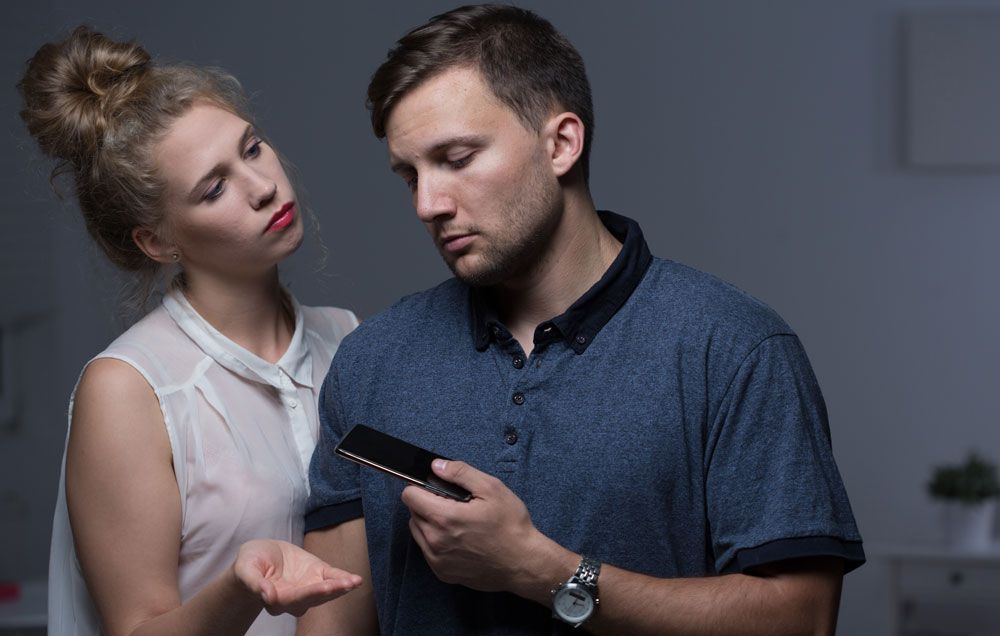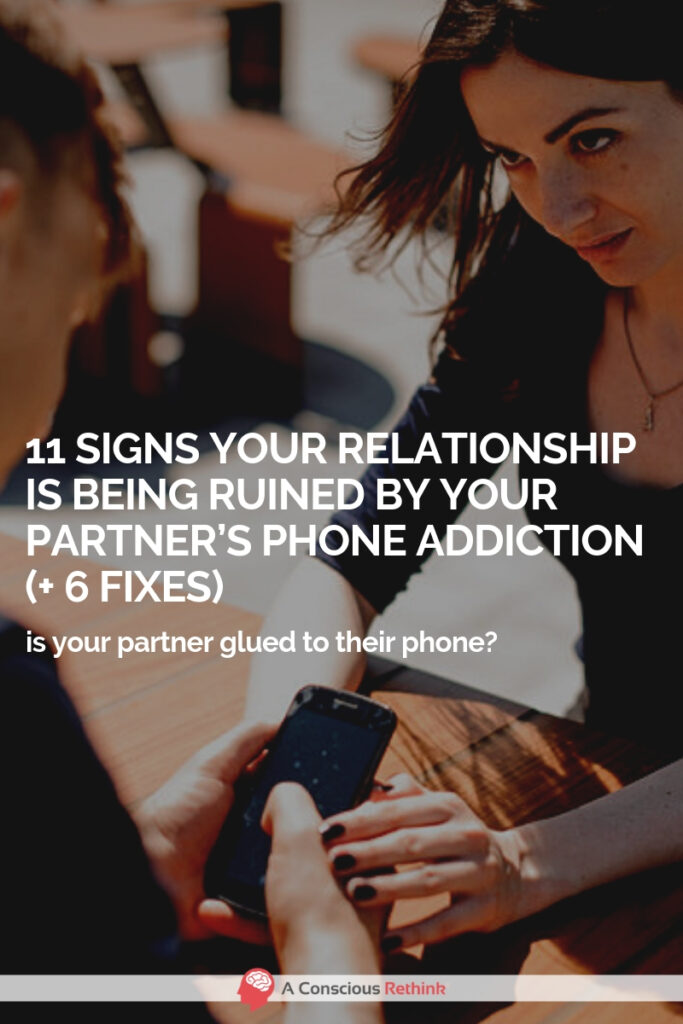
Have you ever found yourself feeling frustrated or ignored because your partner seems to be glued to their phone, not giving you the attention you desire? Well, look no further because we have the perfect solution for you. Our product, “Why Is My Partner Always On Their Phone And Not Paying Attention To Me?” is here to help you understand the reasons behind this behavior and provide you with practical tips to improve communication and reignite the spark in your relationship. With our expert advice, you’ll be able to navigate the digital distractions and enjoy a more connected and fulfilling relationship with your partner. Say goodbye to feeling neglected and hello to a happier, healthier relationship!

This image is property of www.aconsciousrethink.com.
Signs of Excessive Phone Use
Constantly Checking Notifications
If you notice that your partner constantly checks their phone for notifications, it may be a sign of excessive phone use. Whether it’s the incessant buzz of text messages, email alerts, or social media updates, their attention seems to always be divided between you and their phone. This can leave you feeling ignored or unimportant.
Obsessive Need to be Online
Another sign of excessive phone use is when your partner has an obsessive need to be constantly connected to the online world. They may spend hours scrolling through social media, browsing the internet, or playing games on their phone. This obsession can lead to neglecting real-life interactions and can leave you feeling like you are competing for their attention.
Ignoring Social Interactions
When you and your partner are out with friends or spending quality time together, and they consistently ignore social interactions in favor of their phone, it can be frustrating. Instead of engaging in conversations and enjoying the present moment, they may be absorbed in their online world. This behavior can make you feel unimportant and unheard.
Reasons for Excessive Phone Use
Addiction to Social Media
One of the primary reasons for excessive phone use is addiction to social media. Social media platforms are designed to be addictive, with the constant stream of notifications, likes, and comments that trigger a dopamine response in the brain. Your partner may find it hard to detach from their online persona, constantly seeking validation and connection through these platforms.
Escaping Reality
Excessive phone use can also be a way for your partner to escape from the realities of life. It may serve as a distraction from stress, anxiety, or emotional issues they are facing. By diving into the digital world, they can momentarily forget about their problems and avoid dealing with their emotions.
Fear of Missing Out (FOMO)
Fear of Missing Out, or FOMO, is another reason why your partner may be excessively using their phone. They may constantly feel the need to stay updated on what everyone else is doing, afraid that they might miss out on an exciting event or important information. This fear can drive them to constantly check their phone and stay connected, even at the expense of their real-life relationships.
Effects on Relationship
Communication Breakdown
Excessive phone use can lead to a breakdown in communication within your relationship. When your partner is constantly engrossed in their phone, they may not be fully present during conversations or actively listening to what you have to say. This can make you feel unheard and can hinder effective communication, leading to misunderstandings and frustration.
Feeling Neglected
If your partner prioritizes their phone over spending quality time with you, it’s natural to start feeling neglected. Their excessive phone use may make you question your importance in their life and can lead to feelings of loneliness and sadness. It’s essential to address these feelings and find ways to reconnect with each other.
Decreased Intimacy
Excessive phone use can also have a negative impact on the intimacy between you and your partner. When they are constantly on their phone, it can be difficult to create a meaningful connection and to engage in activities that foster intimacy. This can strain your relationship and lead to feelings of dissatisfaction and emotional distance.
Understanding Individual Needs
Open Communication about Expectations
To address the issue of excessive phone use, it’s crucial to have open communication about your expectations as a couple. Discuss how you both feel about the amount of time spent on phones and what is considered acceptable and healthy. By understanding each other’s needs and setting clear expectations, you can work together towards finding a balance.
Recognizing Personal Boundaries
Each person has their own boundaries when it comes to phone use. It’s essential to recognize and respect these boundaries in a relationship. If one person needs uninterrupted time without distractions, it’s important for the other person to honor that need. Understanding and accommodating each other’s personal boundaries can foster a healthier dynamic.
Finding a Balance
Finding a balance between technology and real-life connections is key to maintaining a healthy relationship. It’s important to allocate time for both individual phone use and quality time spent together without distractions. By finding a balance, you can enjoy the benefits of technology while also prioritizing real-life interactions and emotional connection.

This image is property of hips.hearstapps.com.
Possible Solutions
Setting Quality Time Without Phones
One possible solution to excessive phone use is to set aside dedicated quality time without phones. Designate specific moments or activities when both of you agree to put your phones away and fully engage with each other. This can include activities such as cooking together, going for walks, or simply cuddling and talking. By creating phone-free zones, you can focus on strengthening your relationship.
Establishing Phone-Free Zones
In addition to setting quality time, establishing specific phone-free zones can also be beneficial. Designate certain areas in your home or specific occasions when phones are not allowed. For example, you can create a rule to keep phones out of the bedroom to promote better sleep and to foster a more intimate environment for connecting with your partner.
Engaging in Joint Activities
Engaging in joint activities that both of you enjoy can help reduce excessive phone use. Plan activities such as hiking, playing board games, or taking a cooking class together. By participating in shared experiences, you can create new memories and strengthen your bond, reducing the inclination to constantly be on your phones.
Seeking Outside Help
Couple’s Therapy
If the issue of excessive phone use persists and negatively impacts your relationship, seeking the help of a couple’s therapist can be beneficial. A therapist can provide a neutral and supportive environment where you and your partner can explore the underlying issues and develop strategies to overcome them. Together, you can work towards fostering healthier communication and connection in your relationship.
Support Groups
Joining support groups specifically tailored for individuals struggling with excessive phone use can provide valuable insights and tools for addressing the issue. These groups offer a safe space for sharing experiences, learning coping mechanisms, and building a support network with others facing similar challenges. Support groups can provide a sense of community and help in overcoming dependency on phones.
Technology-Free Retreats
For some couples, a technology-free retreat can be an effective solution to break the cycle of excessive phone use. These retreats provide an opportunity to disconnect from the digital world and reconnect with each other. With the guidance of professionals, you and your partner can engage in activities that promote mindfulness, relaxation, and meaningful interactions, allowing you to rejuvenate your relationship.

This image is property of www.aconsciousrethink.com.
Self-Reflection and Self-Care
Taking Time for Yourself
While addressing your partner’s excessive phone use, it’s also important to take time for yourself. Engage in activities that bring you joy and allow for self-reflection. Setting aside moments for self-care not only helps you recharge emotionally but also provides an opportunity to assess your own relationship with technology and ensure you’re modeling healthy behavior.
Exploring Individual Hobbies
Encouraging your partner to explore individual hobbies can also help reduce their reliance on their phone. By engaging in activities they enjoy, they can find fulfillment outside of their online world. Encourage them to pursue interests such as painting, playing an instrument, or joining a sports club. Finding hobbies can provide a sense of purpose and accomplishment, reducing the need for excessive phone use.
Self-Assessment of Phone Use
Take the time to reflect on your own phone use and how it may contribute to the dynamic in your relationship. Evaluate whether you’re setting a good example or unintentionally enabling excessive phone use. By being mindful of your own habits, you can create a supportive environment for your partner to address their excessive phone use.
Addressing Underlying Issues
Stress and Anxiety
Excessive phone use can often be a coping mechanism for stress and anxiety. If you or your partner are struggling with these emotions, seeking professional help, such as therapy or counseling, can be beneficial. By addressing the underlying stressors and learning healthier coping mechanisms, you can reduce the reliance on excessive phone use as a means of escape.
Depression and Loneliness
Feelings of depression and loneliness can also contribute to excessive phone use. If you or your partner are experiencing these emotions, it’s essential to reach out for support. Seeking therapy or joining support groups can provide the necessary tools to address these underlying issues and develop healthier ways to cope.
Insecurity and Jealousy
Insecurity and jealousy can fuel excessive phone use, especially when it comes to social media. It’s important to address these emotions openly and honestly with your partner. Through effective communication and building trust, you can work together to overcome insecurities and develop a more secure, fulfilling relationship.

This image is property of cpi.studiod.com.
Conclusion
Recognizing the importance of balance between technology and real-life connections is crucial for maintaining a healthy relationship. Excessive phone use can lead to communication breakdown, feelings of neglect, and decreased intimacy. By working together, setting clear expectations, and finding a balance, you can prioritize real-life connections, improve communication, and foster a healthier and more fulfilling relationship. Remember, your relationship deserves your attention and effort – so put down your phones and focus on building those real-life connections.






